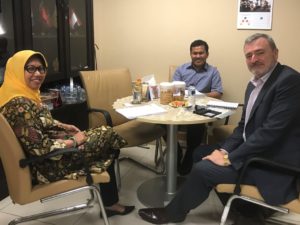
Nigel Carpenter, Sustainable Skills CEO, meeting with Dr. Paristiyanti Nurwardani, Director of Learning, and Hendra Suryanto, at the Ministry of Research Technology and Higher Education this month in Jakarta.
Indonesia, Australia’s largest near neighbouring country, has been on a path of gradual reform for almost 20 years. In recent years, rapid economic development has created a shortage of skills in most industries.
The largest economy in Southeast Asia, Indonesia – a diverse archipelago nation of more than 300 ethnic groups — has charted impressive economic growth since overcoming the Asian financial crisis of the late 1990s. The country’s GDP per capita has steadily risen, from $857 in the year 2000 to $3,603 in 2016. Today, Indonesia is the world’s fourth most populous nation, the world’s 10th largest economy in terms of purchasing power parity, and a member of the G20. An emerging middle-income country, Indonesia has made enormous gains in poverty reduction, cutting the poverty rate to more than half since 1999, to 10.9% in 2016.
Considerable challenges remain in achieving Indonesia’s goals. Out of a population of 252 million, more than 28 million Indonesians still live below the poverty line. Approximately 40% of the entire population remain vulnerable to falling into poverty, as their income hovers marginally above the national poverty line. 1.7 million youth enter the workforce each year.
To continue its economic expansion President Widodo started an infrastructure program to help bring more of the population out of poverty. The program aims to deliver enormous expansion in power generation, large investments in transport infrastructure and a series of new facilities at key ports. The program requires millions of skilled people that today are not available in Indonesia.
President Widodo instructed his Ministries last year to make vocational education reform a priority of the Indonesian Government to improve the quality and competitiveness of his country’s human resources.
Indonesia recognises that its existing vocational education and training system needs reform and reorientation towards an Industry-driven system. President Widodo said curriculum, learning materials, work practice, testing, and certification should be adjusted to meet the demands from the business world and industries. “I also think we have to involve the business world and industries because they have a better understanding about the needs of the workforce” President Jokowi said, adding that the system and demands of the business world and industries must be integrated in the vocational education and training system. The President also said the Government should ease regulations for the opening of private vocational schools.
President Jokowi believes Indonesia’s large population provides the opportunity to improve the country’s productivity yet if Indonesia fails to do so, the big population will potentially create problems.
Australia’s Assistant Minister for Vocational Education and Skills Karen Andrews, during her visit to Jakarta earlier this year said, “Australia is well placed to support Indonesia achieve their skills objectives, drawing on our expertise right across the sector in industry-led, competency-based training, underpinned by excellent quality assurance measures”.
Australia’s Vocational Education and Training (VET) system, which is well regarded internationally, provides opportunities for Australia to support Indonesia to meet its skills needs. Australia’s industry-led, competency-based system provides a useful model for Indonesia to consider when planning reform.
The Indonesia-Australia Comprehensive Economic Partnership (IA-CEPA) which will create the framework for a closer economic engagement between Australia and Indonesia includes discussions on how Australia might be able to build the capacity of Indonesia’s vocational education system.
Indonesia’s challenge is to develop a vocational education industry-led system that supports the needs of a rapidly emerging economy heading towards high income status. Indonesia needs to focus on improving the quality, widening participation and improving efficiency of its vocational education system. Reforms that develop an industry-led competency based modular system as demonstrated in a number of countries, including Australia, will provide the best means to help Indonesians gain employment and benefit from the massive infrastructure program Indonesia is implementing.
